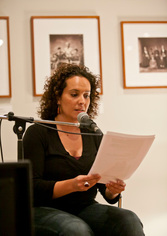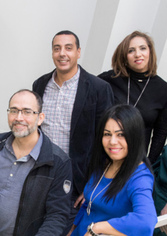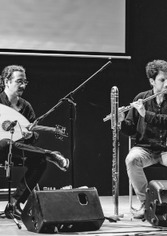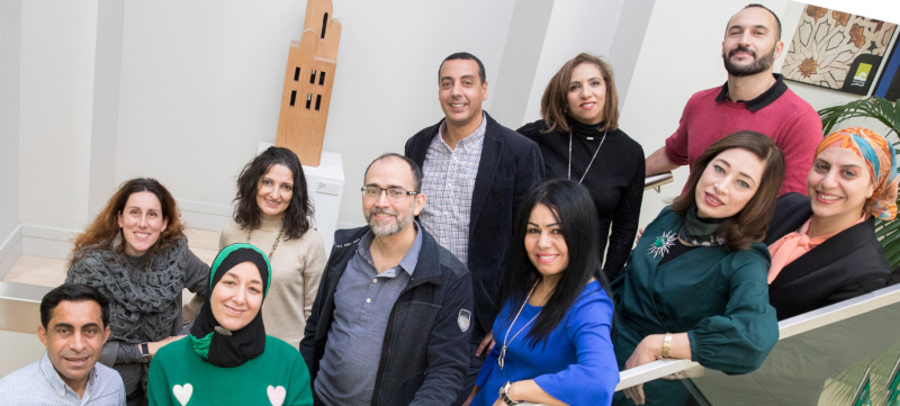Special programs
Index / Activities / Special programs / Why Learn Arabic Today? Ten years of learning, listening and dancing in Arabic
Why Learn Arabic Today? Ten years of learning, listening and dancing in Arabic
June 27, 2019Round table discussion: 7:00 p.m. Poetry recitation competition: 8:15 p.m. Concert: 10:00 p.m.
MADRID
Casa Árabe headquarters (at Calle Alcalá, 62).
Round table discussion: 7:00 p.m. Poetry recitation competition: 8:15 p.m. Concert: 10:00 p.m.
Registration to attend the event (round table discussion and recitation
competition). Seats will be reserved at theconcert for the first 40
people to sign up for the event.
In Spanish and Arabic.
Casa Árabe has organized this event with debates, poetry and music to
celebrate the tenth anniversary of the Arabic Language Center, which
first opened in the academic year of 2008-09.
The day will be dedicated to celebrating the great wealth of experiences, potential and other factors that are enjoyed by learning the Arabic language today. At around table discussion with Arabic Language Center students from different professional worlds, we will be examining what it means to learn Arabic and the professional opportunities it creates at the present time. Poetry, the epitome of all forms of expression in the Arabic language, will also be given special attention, with an Arab poetry recitation competition open to Arabic students. After the recital, we will be holding a cocktail with the participants, the Center’s students and teachers, and everyone else attending. The day of events will end with a concert by the group Orontes, which plays Arab-Mediterranean music.
Over these ten years of work, the Arabic Language Center has gained importance as a center of reference for learning Arabic as a foreign language in Spain, a privileged environment where students can hear, practice and learn more about the Arabic language in all its wealth of expression and forms, including both standard Arabic and dialects (Moroccan Darija, Egyptian and Levantine), for both adults and children. It is notable for its innovative methodology consisting of quarterly course terms for gradual learning and a team of native teachers of many different origins (Algeria, Egypt, Jordan, Morocco, Tunisia and Syria), with acknowledged experience teaching Arabic as a foreign language.
Event information sheet
Over these ten years of work, the Arabic Language Center has gained importance as a center of reference for learning Arabic as a foreign language in Spain, a privileged environment where students can hear, practice and learn more about the Arabic language in all its wealth of expression and forms, including both standard Arabic and dialects (Moroccan Darija, Egyptian and Levantine), for both adults and children. It is notable for its innovative methodology consisting of quarterly course terms for gradual learning and a team of native teachers of many different origins (Algeria, Egypt, Jordan, Morocco, Tunisia and Syria), with acknowledged experience teaching Arabic as a foreign language.
Event information sheet
-

Arabic poetry recitation competition
From June 14, 2019 until June 27, 20198:15 p.m.MADRIDCasa Árabe Auditorium (at Calle Alcalá, 62). 8:15 p.m. Prior registration required.Registration to take part in the competition(no more than 15 participants)
Registration to attend the event (round table discussion + competition).
Seats will be reserved at the concert for the first 40 people to sign up for the event.
In Arabic.
You can now sign up to take part in this competition, which we will be holding on Thursday, June 27, as part of our celebration of the tenth anniversary of our Language Center.Learning Arabic also means discovering Arabic poetry, the epitome of all forms of expression in the language and its oldest literary genre. Its cadence, sound and vocabulary also open learners up to new areas of interest, feelings and emotions through the Arab poets of each historical era. For those Arabic and Spanish-speaking students who love Arabic poetry, this poetry recitation competition is being held, though you must sign up in advance and prepare the recitation of a short poem in Arabic of approximately 10-15 lines (2 minutes at most).
The first 15 people to sign up will get the chance to recite their selected poem and vie for one of the three prizes in the contest. First Prize will consist of a copy of the Dictionary of Modern Cultured Arabic by Julio Cortés (valued at over 120 euros). The jury is made up of: Bahira Abdulatif Yasin, writer and translator; Abdul Hadi Sadoun, writer, Hispanist and editor, and Abdel Wahhab Tounsi, president of the Intercultural Spanish-Arab Circle (CIHAR). All of the contestants will also be reserved a seat at the concert given afterwards. The awards will be given out during a cocktail held for those attending, along with the teachers and students of the Arabic Language Center.
Event information sheet
-

The Arabic Language Center: Ten years teaching Arabic as a foreign language
June 27, 20197:00 p.m.CORDOBACasa Árabe Auditorium (at Calle Alcalá, 62). 7:00 p.m. Prior registration required.Registration to attend the event (round table discussion + poetry recitation competition)
A seat will be reserved at the concert for the first 40 people to sign up for the event.
In Spanish.
Casa Árabe is celebrating the tenth anniversary of its Language Center (CLA) with a full day of events held on Thursday, June 27, beginning with a round table discussion titled “Why learn Arabic today?”The opening session of the event will be presented by Pedro Martínez-Avial, the General Director of Casa Árabe.
Arabic is one of the six official languages of the United Nations and the official language of 25 different countries, including the 22 countries in the Arab League. More than 300 million people communicate in Arabic every day, and it is the fifth most widely spoken language in the world (after English, Mandarin Chinese, Hindi and Spanish, but ahead of French, if all dialects are included). Speaking Arabic makes it possible to interact with people in a very broad geographical area that ranges from North Africa to the Middle East, a young world undergoing transformation, with which we share centuries of history and civilization. It is also a region with which economic exchanges have increased greatly in recent years, and where Spanish companies are carrying out important projects. Learning Arabic has therefore become a safe bet when it comes to increasing the professional potential of students with any academic profile: journalists, doctors, engineers, diplomats, aid workers, economists, etc.
With Arabic Language Center students from different professional worlds, as well as Arabic language education specialists, we will be examining what it means to learn Arabic and the professional opportunities it creates at the present time.
Presented and moderated by: Gonzalo Fernández Parrilla, professor of Arab and Islamic Studies at the Universidad Autónoma de Madrid.
With the participation of:
Yolanda Álvarez Maza, a journalist on the program “En Portada,” former Middle East correspondent and president of the News Programming Board at TVE
Laura Tablada Garcia, of Movimiento por la Paz (Movement for Peace)
Lucía Ortiz de Saracho, a student of International Relations at the Universidad Rey Juan Carlos
Irene López Montes, Documentation Director, Aramco Overseas Company (audiovisual testimony)
Event information sheet
-

Concert by the group Orontes
June 27, 201910:00 p.m.MADRIDCasa Árabe garden (at Calle Alcalá, 62). 10:00 p.m. Free entry.Registration to attend the event (round table discussion + poetry recitation competition + concert)
A seat will be reserved at the concert for the first 40 people to sign up to attend the event.
The day to celebrate the tenth anniversary of the Arabic Language Center will end with this concert, to be held on Thursday, June 27 in our garden.Orontes is the name of one of the most important rivers running through Syria. Moreover, it is the name given to this group created by musicians specializing in different musical traditions from the Middle East and Afghanistan, as well as jazz and flamenco. Though music from the Middle East is their main influence, with their powerful live performance Orontes will take us on a journey to a unique space of sound within today’s world of what are referred to as musics of the Mediterranean. Most of the pieces in Orontes’ concert are compositions of their own from their first album, “Dancing on the Heads of Snakes,” a title which refers to a tribal tradition in Yemen and other countries in the region. Orontes’ members are Michel Gasco, Alberto Centella, Vic Guadiana, Pancho Brañas and José Conde.
Event information sheet
Concert information sheet
Group members:
Michel Gasco (Arabic oud, Afghan rubab)
Gasco studied the Arabic oud in Damascus and Aleppo, Syria, with masters of the highest level. He later began to study the Afghan rubab in Iran. He has taken part in many international festivals and gone on tour with various groups: Vandalus, Homs Band and Orontes in Europe, the Middle East and Japan (the Damascus Opera House , King Hussein Gardens in Amman, etc.). In addition to his work as a musician and composer, he works as a documentary film director specializing in Eastern music, having directed cultural research projects and directing documentaries in Syria, Iran, Afghanistan and Turkey, with projects supported by the AECID and the British Council, as well as others.
Alberto Centella (concert flute, bass flute, bansuri)
A flautist, musicologist and composer, Centella has been active for over ten years in the worlds of flamenco and world music, being especially devoted to work with the band that he himself created, Vandalus, with which he has taken part in many different festivals in Spain, Finland, Morocco and Portugal. He has composed soundtracks that have garnered great success, including “La Hermosa Jarifa,” a work which he presented at the Almagro International Classical Theater Festival in 2014; “Walladah, the Last Umayyad Princess,” along with Michel Gasco, and the “Viuda Valenciana” (“Valencian Widow”), a work which is premiering at the 2019 edition of the Classical Theater Festival in Almagro.
Vic Guadiana (violin, viola)
Guadiana is currently one of the finest flamenco violinists in Spain, as well as a major expert on the violin in other styles, includingjazz and world music. He has shared the stage with top-level performers and companies that have made a name of their own, such as flamenco dancer Lola Greco, instrumentalists like Chano Domínguez and vocal artists like Maria Toledo.
He has earned numerous awards, including, in June of 2018, First Prize in the Spanish and Flamenco Choreography Competition for the best original musical composition for dance, with the song “Boreal,” for a piece by Daniel Ramos and Víctor Martín.
Pancho Brañas (percussion)
With over 30 years of experience in the world of jazz, Latin music and world music, Brañas has recorded over 50 studio albums for a wide range of projects, including his own. Throughout his career, he has shared the stage with prestigious performers and taken part in various international tours, musicals and musical bands for theater, which has led him to travel to over 15 countries. His specialties are the drums and flamenco cajón, instruments which he combines with others in the Eastern tradition, such as theriqq, the bendhir and the udu.
Jose Conde (double bass)
Since 1985, Conde has dedicated his career to playing this instrument professionally. His musical interests led him to the double bass, which inevitably drew him closer to jazz music, as well as going on tours in Europe and Asia. For three years in a row, he has also taken part in the Circuito de Jazz Andaluz, performing at concerts in different theaters all over Andalusia. He has performed with musicians such as Jaime Márquez, Daniel Amat, Aurora Guirado, Richard Ray Farrell and Eric Hichcock. Most notable was his performance at the Southport Jazz Festival with Eva Ruiz, with Brazilian singer Cintia Rodríguez and his recordings with Bai Kamara Jr. after going on concert tours in Belgium.

